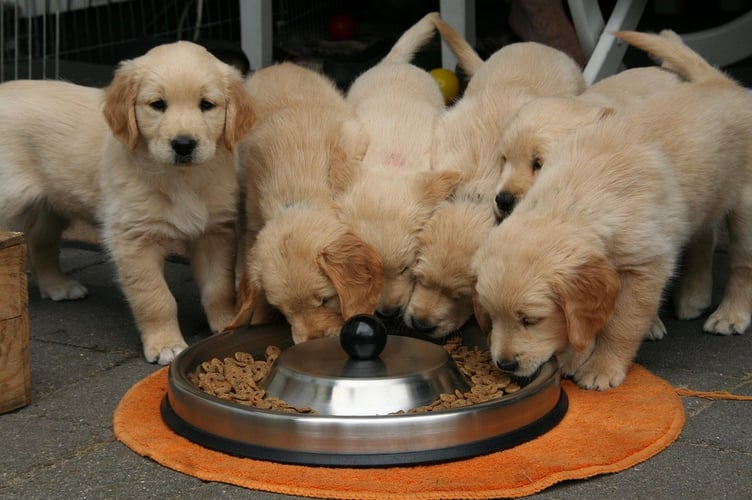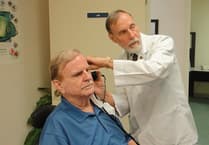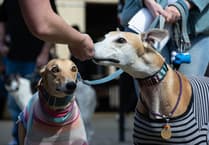A compulsory scoring system for licensed dog breeders similar to food hygiene ratings should be considered in Carmarthenshire and throughout Wales, a group of have councillors stated.
It was one of the recommendations made by members of a Carmarthenshire Council task and finish group who spent a year reviewing the work of the authority’s dog breeding licensing team.
The group’s final report said there was evidence of a range of standards among licensed dog breeders in Carmarthenshire from those who met minimum standards to those who operated at a higher level.
The report said the impact of a Trading Standards-approved “buy with confidence” scheme was limited because it was voluntary and that options for a compulsory scoring system should be explored.
If adopted it would be akin to the system by which premises handling food are rated from zero to five and display the rating at their entrance.
Dog breeders who took part in the group’s review told councillors they felt unfairly scrutinised and penalised for being licensed when they said there were so many unlicensed operators.
The report said: “Licensed breeders in general want to do the best that they can, however they want there to be a fairer playing field.”
Carmarthenshire had 71 licensed breeders at the start of the review. It dropped to 53 – ten of whom had more than 100 dogs – as the review progressed, but the county was still said to have among the highest number of licensed breeders in England and Wales, including farmers who have diversified to supplement their income.
Anyone keeping three or more breeding bitches must obtain a licence in Wales, with adult dogs defined as over six months of age. All the dogs must be micro-chipped as part of the licensing regime. Anyone operating a business selling animals as pets must also be licensed although there are exemptions for genuine hobby breeders.
Carmarthenshire Council has an animal health team comprising 7.8 full-time equivalent officers who oversee the regulation of 12,500-plus known animal premises, but only 1.8 of them focus on animal licensing including dog breeding and enforcement.
The report said: “It was agreed by all stakeholders that the current staffing of 1.8 officers is insufficient. This is not enough resources to deal with dog breeding alone, let alone the other work covered.”
There is also a regional animal licensing Wales team based in Monmouthshire which carries out inspections on behalf of Carmarthenshire and other councils.
Regulations came into force in Wales in 2014 and again in 2021 to help protect the welfare of breeding dogs and puppies and regulate commercial pet-selling activities. This has significantly increased officers’ workloads, said the report.
It added that officers sometimes faced resistance from breeders about licensing conditions, and that preparing prosecution cases was time-consuming. It also said there were sometimes conflicts of interest between private vets’ professional standards and high revenue from dog breeders.
In terms of dealing with unlicensed breeders, the report said it could be difficult to obtain warrants to enter a property and seize animals, and again that preparing court cases was time-consuming.
However it cited seven significant prosecutions of illegal dog-breeding activity by the council, including one where 230 dogs were seized from an illegal breeder and another where a £104,000 proceeds of crime confiscation order was issued.
The task and finish group made five recommendations for cabinet to consider, such as more investment in the team, and more advice for the public on what to look for when buying a puppy.
The group also made seven national recommendations, including a review of licensing fees, a more robust micro-chipping system, and more effective tracking of illegal breeders who moved around to avoid detection.
The recommendation to consider a new compulsory scoring system applied to Carmarthenshire and nationally.
Presenting the report at a cabinet meeting on October 13, Cllr Kevin Madge, of the task and finish group, said he hoped some of the recommendations would be adopted and make a difference.

Cllr Aled Vaughan Owen, whose cabinet portfolio includes animal health, thanked all those involved in the work and said it had highlighted the complexity around dog-breeding legislation.
“The recommendations will be considered carefully – in time I hope that many of them, if not all, will be implemented,” he said.
The Welsh Government said effective enforcement was essential and acted as a deterrent to breeders who didn’t meet the standards expected, and that its animal licensing Wales project had boosted the capacity to investigate illegal breeding.
“We pride ourselves on having excellent animal welfare standards and expect everyone to reflect this by being responsible owners and breeders,” it said in a statement.
“We have introduced significant measures to safeguard the welfare of dogs in Wales including our dog breeding regulations, introduced in 2014, which led the way in addressing welfare concerns at dog breeding establishments.”





Comments
This article has no comments yet. Be the first to leave a comment.